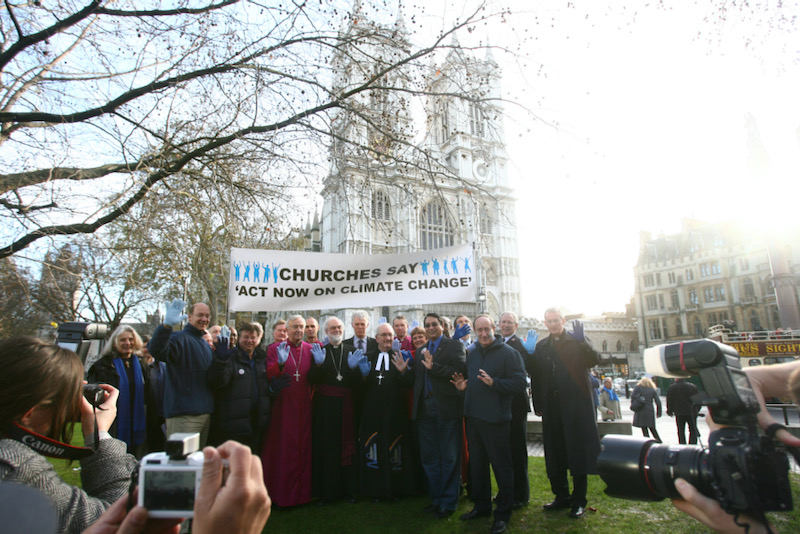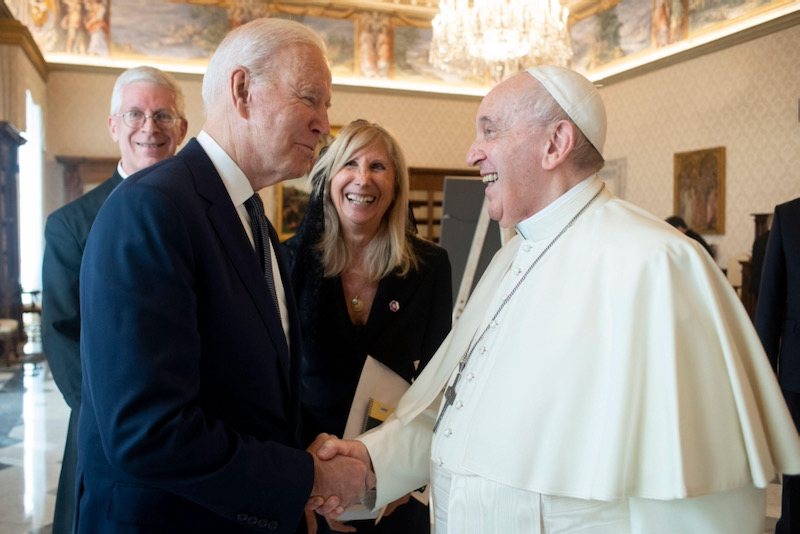Pope Francis’ meeting with President Joe Biden was a rebuke to those in the United States who want to deny Biden communion.
Following his 29 October papal audience, the first Catholic president of the US since John F Kennedy revealed that Francis told him he was a “good Catholic” and should keep receiving communion. The following day he attended Mass at St Patrick’s Church in Rome and did just that. After all, he was given the green light from the Bishop of Rome.
Biden’s comments, coupled with pictures of the Democrat president meeting the Pope, have already triggered a negative reaction from some in the United States. A group of bishops, with the backing of Catholic networks sympathetic to President Donald Trump, would like Biden to be denied communion because of his support for legal abortion. The US hierarchy is in discussions about a document on the Eucharist which is predicted to include a public rebuke to Biden and other Catholic politicians.
Even though Biden supports policies on abortion that contradict Catholic teaching, the Pope has modelled a path of handling disagreement which avoids dragging the Church deeper into the toxicity of the culture wars. He’s done this in three ways.
The first is the focus on dialogue rather than confrontation. President Biden and the Pope spoke for 75 minutes in the library of the Vatican’s Apostolic Palace, an unusually long time. By comparison, Francis spoke with President Barack Obama for 52 minutes and President Trump for 30 minutes.
The Pope and the President had plenty to talk about. Their audience took place ahead of the G20 summit in Rome and the COP26 gathering in Glasgow and they discussed the critical issues facing humanity including the climate crisis, the global vaccine shortage, poverty and offering assistance to migrants. All of these are pro-life issues.
The length of the meeting spoke volumes about the wide range of areas where the Holy See and the Biden administration can work together, while the Pope did not need to raise the question of communion for politicians who support abortion as he had addressed this on the papal plane returning from Slovakia.
“We do not know exactly what Francis said to Biden about the controversial issue, but the meeting was very warm. This is another ‘climate change’ the US bishops are trying to ignore,” Massimo Faggioli, Professor of Theology and Religious Studies at Villanova University, Philadelphia, and author of Joe Biden and Catholicism in the United States, explained.
This brings us to the second part of the approach. Whatever the depth of the disagreement between church and political leaders over abortion, the weaponisation of the Eucharist cannot be the answer. It doesn’t mean there are no grounds at all for refusal of communion. In 2014, the Pope told Mafia bosses that they are excommunicated, while activists who try to use taking communion to further a particular cause have been refused by bishops in the past.
In the US, however, it was only after the election of President Biden that some bishops started talking about producing a document on the eucharist and communion. It gave the impression that Biden was being targeted and opened up the disturbing possibility that refusing the Eucharist might become another weapon in part of the wider culture war. By contrast, the Pope has repeatedly stressed that although communion “is the fullness of sacramental life, is not a prize for the perfect but a powerful medicine and nourishment for the weak.”
Thirdly, Francis’ papacy has put a consistent emphasis on the pastoral character of doctrine. In other words, the Church’s doctrine is not to be used in a punitive manner and instead should follow its primary purpose of bringing people closer to God. While the Pope has repeatedly condemned abortion and likened it to “hiring a hitman”, he’s also given priests the authority to forgive the sin of procuring an abortion. This authority was previously only in the hands of bishops. Crucially, he’s warned against the Church becoming “obsessed with the transmission of a disjointed multitude of doctrines to be imposed insistently”, and turning certain teachings into an idol.
“We must be careful not to fall into the temptation of making idols of certain abstract truths,” the Pope told priests in 2018. “The ‘truth-idol’ imitates, it dresses itself up in the words of the Gospel, but does not let those words touch the hear…Much worse, it distances ordinary people from the healing closeness of the word and of the sacraments of Jesus.” The Pope repeatedly talks about the task of spiritual accompaniment, a process that starts by meeting someone where they are, rather than simply pointing them to a rule book. This includes politicians.
Meetings between Popes and world leaders are protected by a seal of confidentiality and, apart from interpreters, no one else is in the room when discussions take place.
It’s designed in this way to allow a head of state or government to speak freely and, if necessary, ask for guidance and advice. Political figures often get a lot out of a papal audience, and this Pope has become something of a confessor to world leaders. The outgoing German Chancellor, Angela Merkel, has had five private audiences with Francis. It also means that the Vatican is not going to issue a clarification over what Biden said afterwards and has said it was a "private conversation." Saying anything would undermine the tenet of confidentiality, a key tenet of papal audiences.
Despite the very strong signal sent by the Pope with his Biden meeting, Professor Faggioli says that the “anti-Francis bloc” in the US “will continue to treat Francis as a ‘lame-duck’ Pope, ignoring him and planning for post-Francis period”. But he said it could also give “courage” to those bishops who are supportive of this pontificate and for them to speak openly about what he describes as the “crisis of acknowledgement of the papacy” when the US bishops’ conference meets from 15-18 November in Baltimore. The Pope has given them a roadmap to follow.



 Loading ...
Loading ...